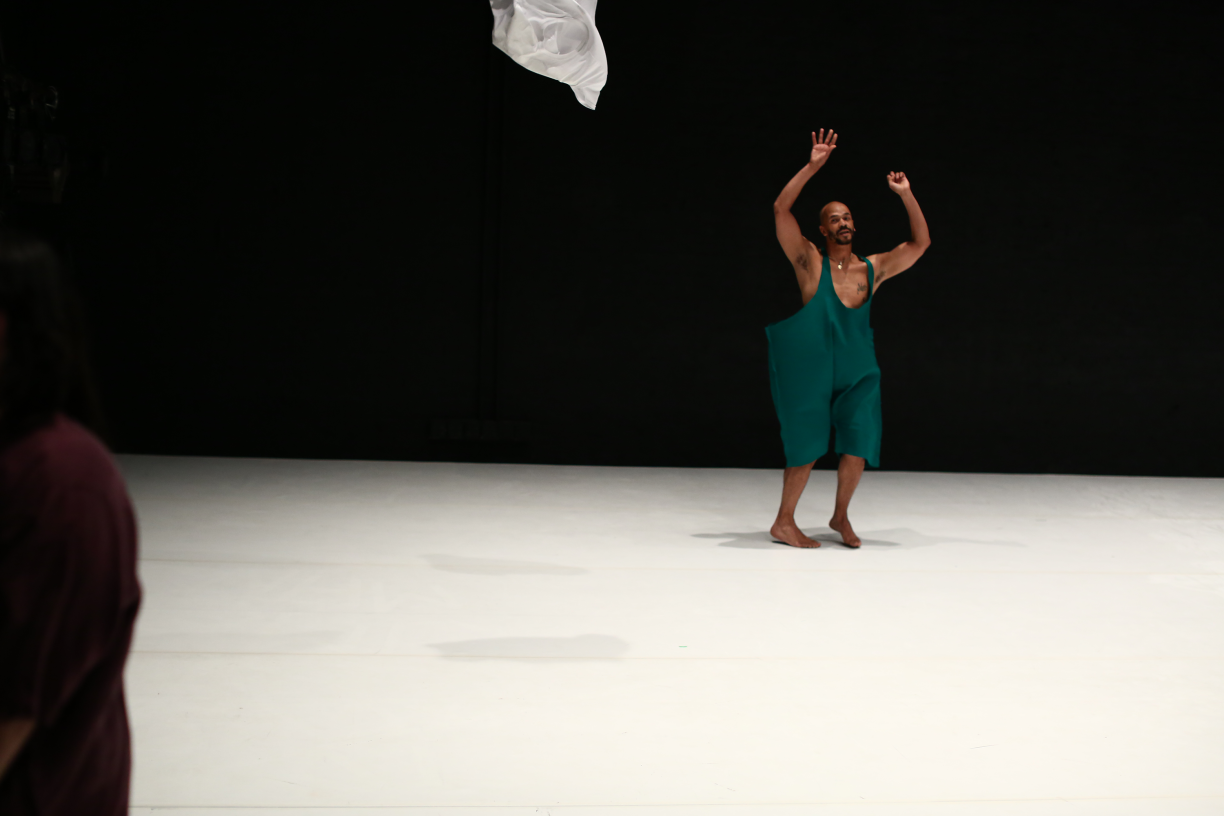Help BOMB ring in the new year with a benefit for artists and writers. Hosted by ISSUE Project Room and curated by David Grubbs, the evening features choreographer and dancer Jen Rosenblit's Clap Hands, poetry by Ariana Reines, and music by 75 Dollar Bill. Attendees will also enjoy free drinks and copies of BOMB Issue 130.
A donation of $25 gains admission for one, or buy a pair of tickets for $45. All proceeds go to paying BOMB's online contributors in 2015.
Jen Rosenblit has been making dances and teaching workshops on improvisation, choreography and performance in New York City since 2005. Rosenblit has worked with Young Jean Lee (Untitled Feminist Show), Ryan McNamara (MEEM), Yvonne Meier (The Shining), Sasa Asentic (On Trail Together) and currently, Simone Aughterlony (Uni-Form), based in Zurich. Rosenblit was a 2009 Fresh Tracks Artist (Dance Theater Workshop), recipient of the 2012 Grant to Artists and a 2014 Emergency grant from the Foundation for Contemporary Arts, a 2013 Fellow at Insel Hombroich (Germany), an inaugural recipient of THE AWARD, a 2014-2015 workspace artist through LMCC, and a 2014 recipient of a New York Dance and Performance “bessies” award as emerging choreographer for her work, a Natural dance, which premiered at The Kitchen in May 2014. Rosenblit has been a teaching artist at Bowdoin College, Hollins University, Bard, Tisch, Roger Williams and Bennington and has done lecture demonstrations surrounding the queer body and performance at both Yale and Harvard. Rosenblit's Lunch N Lecture was curated by BODEGA at the ICA, Philadelphia, as part of their First Among Equals series. Rosenblit was recently in residence at the Minneapolis Institute of the Arts through FD13 and looks forward to residency time at the Chinati Foundation in Marfa for the creation of a new work to premiere in 2016. Recent works focus on an improvisational approach to choreographic thought and ways of structuring bodies as they fall out of relation aesthetically and spiritually while still locating ways of being together.
Poet, playwright, and translator Ariana Reines' books of poetry include The Cow (2006), which won the Alberta Prize from Fence Books; Coeur de Lion (2007); and Mercury (2011). Her poems have been anthologized in Against Expression (2011) and Gurlesque (2010). Known for her interest in bodily experience, the occult, new media, and the possibilities of the long or book-length form, Reines has been described as “one of the crucial voices of her generation” by Michael Silverblatt on NPR’s Bookworm. At once personal, Romantic, slippery, and extreme, Reines’s poetry investigates and overturns lyric conventions. Of her own work, she admitted in an interview with HTML Giant: “My best writing seems to have to be forced from me by some other force but that force has to be one whose power I agree to serve.”
Reines’s first play Telephone (2009) was performed at the Cherry Lane Theater and received two Obie Awards. A re-imagining of its second act was featured as part of the Guggenheim’s Works+Process series in 2009, and the script was published in Play: A Journal of Plays in 2010. Reines’s translations include a version of Baudelaire’s My Heart Laid Bare (2009); Jean-Luc Hennig’s The Little Black Book of Grisélidis Réal: Days and Nights of an Anarchist Whore (2009); and Tiqqun’s Preliminary Materials Toward a Theory of the Young-Girl (2012).
75 Dollar Bill is a Brooklyn-based duo of Rick Brown on percussion and homemade horns, and Che Chen on electric guitar. Brown was born in San Francisco, CA and is a clerical worker at a law school in NYC. Chen was born in New Haven, CT and works for a cancer diagnostics company in Stonybrook, NY. They met via myspace and started playing together as 75 Dollar Bill approximately eight years later. After two self-released cassette tapes, their first LP, Wooden Bag, will be released via the Other Music Recording Company in January 2015.
“What you heard foremost in 75 Dollar Bill’s Saturday night show at Troost in Greenpoint, Brooklyn, was Che Chen’s guitar: a cut-rate Japanese model sketching looped figures inside old Arabic modes, pushing jagged sound through a small amplifier...But as [he] stood playing hypnotic guitar repetitions, moving with the stresses of the riffs, the drummer Rick Brown sat on a square wooden box, open in the back, and attacked it from above. Sometimes he used his heel to bounce on a kick-drum pedal, pointing backward toward the box; mostly he was striking the sides of the box with his hands and a homemade mallet, hard, finding different pitches in different places. He cued transitions in the music, building odd or compound rhythms, turning them around and blurring distinctions between downbeats and upbeats. On the surface, the rhythms were only secondary to the guitar lines; deeper down, they were enfolded. One couldn’t do without the other.”
—Ben Ratliff, New York Times


